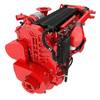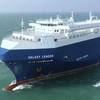Kirby Inland Marine, headquartered in Houston, Texas, is the leading carrier of liquid bulk goods
along the inland waterways in southern US. Kirby’s fleet of 215 tugboats and 911 tank barges is
the largest in the country and corresponds to about one third of the total tank barge tonnage in the US.
Kirby Inland Marine is listed on the stock exchange in New York and transports oil products and agricultural chemicals on its tank barges. The total transport capacity corresponds to 16.6 million
barrels.
Kirby is in the midst of re-engining its fleet and the new engines being installed are from
Volvo Penta. Volvo Penta has delivered slightly less than 100 engines to date in sizes from
5 to 34 litres cylinder volume to boats in Kirby’s fleet.
More than 40 of the engines delivered are for powering the tugboats. These engines operate under
the toughest conceivable conditions, in which each boat pushes a line of connected barges, in
temperatures that are often 40 degrees C in the air and 25 in the water. This places major demands
on performance and effective cooling of the engines.
New engines to entire fleet
However, perhaps the heaviest demand is placed on the environmental properties of the engines.
Previously, Kirby’s tugboats were often propelled by two-stroke diesel engines, which in general
have significantly higher values with regard to fuel consumption and exhaust emissions. When
Kirby decided to replace these with new engines, the company placed high environmental demands
on the engine suppliers. Volvo Penta was a clear choice.
“We are very satisfied with the result. Our demands were that the new engines must deliver
better economy, higher performance and lower exhaust emissions and we received this from
Volvo Penta,” says John Sansing, Vice President Maintenance, at Kirby Inland Marine.
Important segment
The cooperation with Kirby represents a breakthrough for Volvo Penta in a highly important
segment.
“With our engine program of 100 to 2,000 hp, we have engines that are especially suitable for
virtually all boats in inland waterway and canal traffic. This is a very large market, particularly
in the US,” says Bertil Börjesson, Strategy Manager for Volvo Penta’s Marine Commercial
operations. “In terms of energy and the environment, barge transports in our opinion are a much
better alternative compared with shipment by land. Having one of the largest and most successful companies in the industry as a customer is undoubtedly very positive.”
Subscribe for
Maritime Reporter E-News
Maritime Reporter E-News is the maritime industry's largest circulation and most authoritative ENews Service, delivered to your Email five times per week












